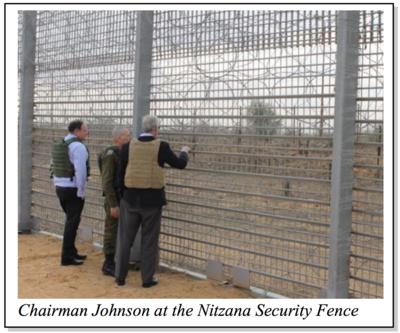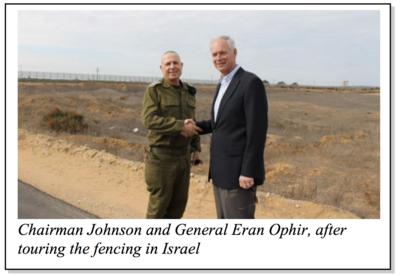A virtually impenetrable fence quickly and cheaply built by Israel to keep terrorists and thousands of unwanted refugees out is fast becoming a model for President Trump’s wall as lawmakers begin to look for funding the top campaign promise of the 2016 election.
Israel’s example is being bolstered Wednesday by a new report from Senate Homeland Security and Governmental Affairs Chairman Ron Johnson who recently visited the Jewish State and returned with an armload of evidence that the fence helping to keep Israel safe is one the U.S. government should consider.
Just consider price: Israel’s fence cost $2 million a mile to build. The U.S. fence and wall have cost nearly double, at $3.5 milllion per mile.

“Israeli fences have proven more effective than the fencing in the United States and, in regards to the fencing along its border with Egypt, was constructed at a significantly cheaper cost. The characteristics of Israel’s fences offer important lessons for the United States as it seeks to construct additional fencing along the southwest border,” said the report, titled, “Securing Israel: Lessons Learned from a Nation Under Constant Threat of Attack.”

The chairman supports Trump’s wall and has taken a common sense approach to its construction and payment, which he hopes to keep lower than some of the inflated estimates. Johnson also believes that the wall will be a job creator and draw new technology to the problem of mass illegal immigration across the U.S.-Mexico border.
In December Johnson traveled to Israel to review that country’s walls, airport security and cyber security. One focus was on the Nitzana Security Fence built on the Egyptian border in two years and completed in 2013 to stop a refugee rush from Africa.

He found that Israel’s was cheaper to build than what the U.S. has spent so far, manned better and is far more effective in stopping illegals from entering. Among the findings in the report provided in advance to Secrets:
— Israel constructed a fence along its border with Egypt in approximately two years. Israel spent $415 million ($2.0 million per mile) to construct a 143-mile fence on its border with Egypt. The United States has spent $2.3 billion to construct 654 miles of pedestrian and vehicle barrier fencing along the U.S.-Mexico border, averaging about $3.5 million spent per mile – representing a 21 percent higher cost per mile than Israel.
— Israel spends approximately $8.3 million annually ($58,000 per mile) to maintain its 143-mile fence bordering Egypt. The United States spends $50 to $55 million annually ($77,000 per mile) maintaining its 650 miles of fencing along the border with Mexico—33 percent more than Israel.
— Israel stations approximately one person for every 1.2 miles of fencing along its border with Egypt. The United States stations approximately 1 person for every 2.2 miles of its border with Mexico.
— The number of illegal crossers on the Israel-Egypt border dropped after the construction of the fence, from more than 16,000 in 2011 to less than 20 in 2016 – a 99 percent decrease.
The newly re-elected Wisconsin senator met with government and military officials during his trip and came away convinced that the U.S. should consider Israel’s experience as it builds a new wall.
“Israel’s swift and effective border security measures provide lessons for the United States and other countries seeking to protect their citizens from the threat of terrorism and illegal migration,” said his report.
It added, “When Israel faced an uncontrolled migration flow entering through its border with Egypt, it quickly constructed a fence that put an immediate end to this migration. When suicide bombers crossed a porous boundary line between Green Line Israel and the West Bank with the intent to inflict mass casualties on Israeli citizens, Israel promptly built a barrier to inhibit terrorists’ access to the country.”
Paul Bedard, the Washington Examiner’s “Washington Secrets” columnist, can be contacted at [email protected]
